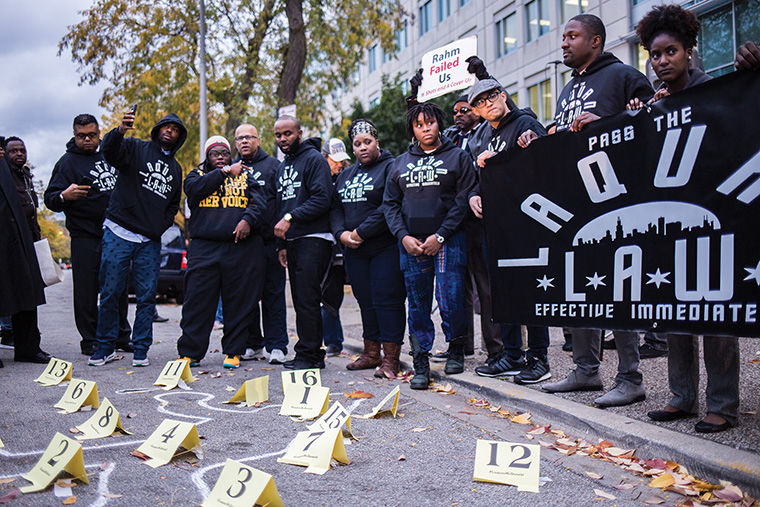Recall election procedures requested in honor of Laquan
Recall elections of Chicago officials in honor of Laquan McDonald have support, but many doubt the bill will be successful in the Illinois State House.
October 31, 2016
One day before the two-year anniversary of the fatal shooting of Laquan McDonald by Chicago police officer Jason Van Dyke, legislation written in the 17-year-old’s name was introduced that would permit recall elections for local government posts, including Chicago’s mayor, city aldermen and the Cook County state’s attorney.
According to the Laquan McDonald Act—House Bill 6616 introduced in the Illinois General Assembly Oct. 19 by State Rep. Kenneth Dunkin—a petition certified by the Chicago Board of Election Commissioners and signed by at least 10 percent of the total votes cast in the preceding mayoral election would allow for a recall election.
Recall elections for city aldermen would require the same percentage, and recall elections for the Cook County state’s attorney would require five percent.
According to figures compiled by National Conference of State Legislators, only a few states have that low a threshold for removal of elected officials.
“This is the second anniversary of the cold-blooded murder of an innocent 17-year-old,” Dunkin told The Chronicle. “The least we can do is create a justifiable legislation to stop that from happening in the future.”
The Laquan McDonald Act also states that a certified petition cannot be withdrawn, another petition cannot be filed within six months of a failed recall election, and one cannot be filed with less than six months remaining in an official’s term.
Rev. Larry Dowling, a member of the Community Renewal Society, an organization that trains community activists, said there should be a procedure to recall a mayor but has doubts about the bill’s success.
“[The Laquan McDonald Act] will not likely pass in the current legislature,” Dowling said. “[However], it is always wise to have recall possibilities for those who abuse their power.”
An Oct. 24 emailed statement from Mayor Rahm Emanuel’s Communications Director Adam Collins stated that the mayor is working to ensure transparent investigations of any use of force.
“The mayor’s focus is on implementing the reforms necessary to prevent another unnecessary death in the first place,” the statement said. “People will see through the politics and make their own judgments on the bill.”
However, Dunkin, who lost his bid for reelection in the March 2016 midterm to Juliana Stratton, said officials should have no reason to oppose the bill.
Critics, such as Dunkin and Dowling, think if the McDonald video had been released before the election, Emanuel would not have won his bid for reelection.
Dick Simpson, a political science professor at the University of Illinois at Chicago, said a constitutional amendment is needed before recall elections can be initiated.
“I’m not sure how [Dunkin] is dealing with the legality of this [bill],” Simpson said.
Simpson said, at this time, it is more likely that legislation creating term limits will pass, such as the petition calling for two-term limits on Chicago mayors by Take Charge Chicago, an organization advocating for transparent government, supported by former Gov. Pat Quinn.
In December 2015, State Rep. La Shawn Ford introduced House Bill 4356, which also included mayoral recall election procedures. However, HB4356 required a petition signed by 15 percent of the total votes cast for mayor in the preceding election. Gov. Bruce Rauner gave his support, but the bill never made it past the Illinois House.
Ford said citizens should be able to hold government accountable, and recall elections could provide that opportunity, adding that additional city aldermen and Cook County state’s attorney offices in HB6616 could affect the outcome.
“Time will tell if making the bill more complicated and including more offices in the bill would bring more opposition or support,” Ford said.
Timeliness and paying tribute to McDonald’s death could be part of Dunkin’s strategy to get support because it has the public’s attention right now, according to Ford.
“There’s a lot that goes into passing legislation in Springfield,” Ford said. “You have to do everything you can to get as much public support as possible.”
Dunkin said he is still confident the bill will pass and said its goal is holding the mayor, city aldermen and Cook County state’s attorneys accountable when they fail to perform their duties to protect their constituents.
“This is a reaction to their cover-up [of McDonald’s death]—a simple, do-the-right-thing legislation,” Dunkin said.








